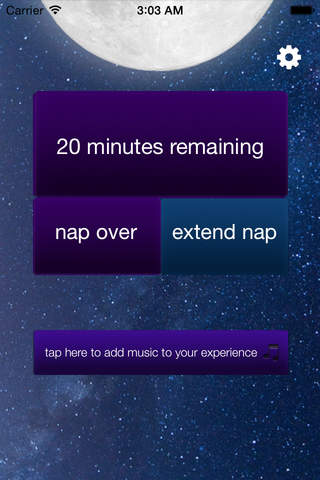
Power Nap - Sleep. Relax. Refresh. Perform - Refresh your mind and work better and more productively
Power nap puts you to sleep quickly at any time of the day!
Taking a nap during the day refreshes your mind and helps you work better and more productively!
Napping is especially important for thinkers! If you think a lot and reach a dead end, try taking a quick nap. While you sleep, your mind will subconsciously process all the ideas, and when you wake you’ll have come up with plenty more ideas you couldn’t have imagined! It’s proven to work!
FEATURES:
- Fall asleep quickly using proven relaxing methods!
- Refreshes you better than coffee or energy drinks!
- Works even on difficult sleepers!
- You’ll fall asleep within minutes!
- Play background music from your iPod!
- Our design was scientifically created to relax your eyes and drift you to sleep!
- It really works!
Characteristics
The power nap is thought to maximize the benefits of sleep versus time. It is used to supplement normal sleep, especially when a sleeper has accumulated a sleep deficit.
Various durations are recommended for power naps, which are very short compared to regular sleep. The short duration of a power nap is designed to prevent nappers from sleeping so long that they enter a normal sleep cycle without being able to complete it. Going beyond sleep stages I and II but failing to complete a full sleep cycle, can result in a phenomenon known as sleep inertia, where one feels groggy, disoriented, and even more sleepy than before beginning the nap. Brief naps (10–15 minutes) can improve alertness directly after awakening without the detrimental effects of sleep inertia associated with longer naps.
Benefits
Power naps of fewer than 30 minutes—even those as brief as 6 and 10 minutes—restore wakefulness and promote performance and learning. A University of Düsseldorf study found superior memory recall once a person had reached 6 minutes of sleep, suggesting that the onset of sleep may initiate active memory processes of consolidation which—once triggered—remains effective even if sleep is terminated.
A Flinders University study of individuals restricted to only five hours of sleep per night found a 10-minute nap was overall the most recuperative nap duration of various nap lengths they examined (lengths of 0 min, 5 min, 10 min, 20 min, and 30 minutes): the 5-minute nap produced few benefits in comparison with the no-nap control; the 10-minute nap produced immediate improvements in all outcome measures (including sleep latency, subjective sleepiness, fatigue, vigor, and cognitive performance), with some of these benefits maintained for as long as 155 minutes; the 20-minute nap was associated with improvements emerging 35 minutes after napping and lasting up to 125 minutes after napping; and the 30-minute nap produced a period of impaired alertness and performance immediately after napping, indicative of sleep inertia, followed by improvements lasting up to 155 minutes after the nap.


